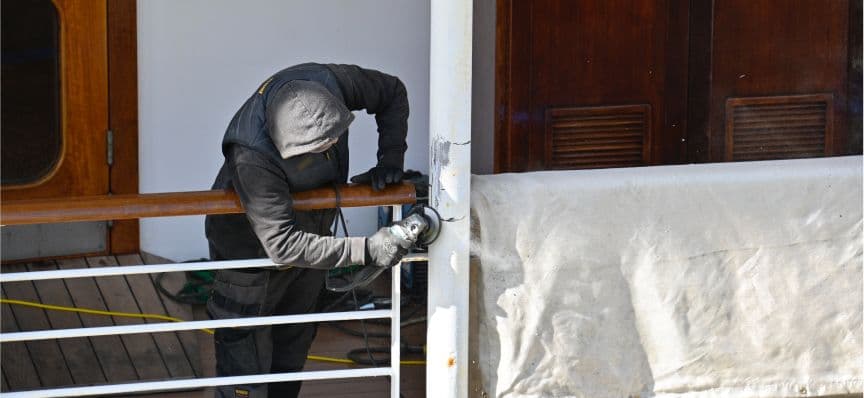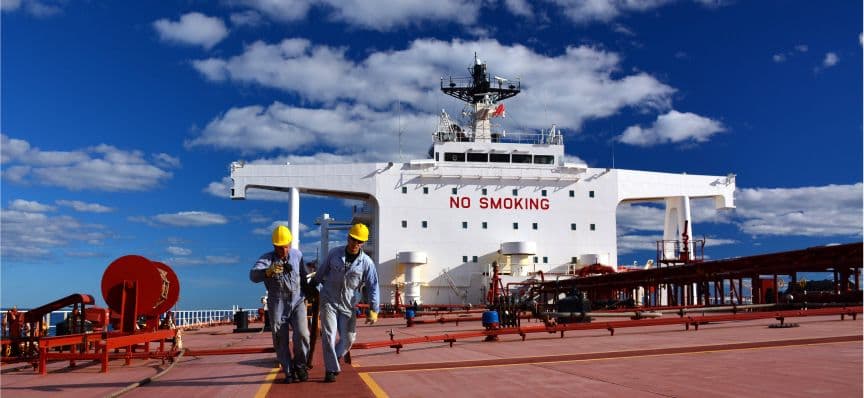Niayesh Sadrzadeh
Content Marketing Manager

Ordinary Seaman: Complete Guide to Becoming an OS
Becoming an ordinary seaman can be an exciting and fulfilling career path for those who are looking for entry-level maritime jobs.
If you love the ocean and desire to embark on a challenging and rewarding career, becoming an ordinary seaman might be the right choice for you. With opportunities to travel to new places, work with a diverse crew, and learn valuable skills, the life of an ordinary seaman can be an adventure like no other.
However, starting a career as an OS requires meeting specific requirements and obtaining the necessary training and certifications. In this guide, we'll provide you with a step-by-step overview of what it takes to become an ordinary seaman, including the qualifications you need, where to get training, and how to find a job in this field.
Whether you're a recent graduate, a career changer, or simply someone looking for a new challenge, this guide will give you the information you need to chart your course and start your journey toward becoming an ordinary seaman. So, let's get started on this exciting career path and discover the world of opportunities that awaits you at sea.
What Does an Ordinary Seaman (OS) Do?
An ordinary seaman, also known as an OS, is an entry-level position in the maritime industry. OSs typically work on a ship or vessel and are responsible for assisting the deck crew in various tasks related to the operation and maintenance of the vessel. If you're interested in becoming an ordinary seaman, the first step is to meet the requirements for the position, including age, education, and physical fitness. Then, you'll need to obtain the necessary training and certifications, such as completing a maritime training program and obtaining a Merchant Mariner Credential (MMC). Once you've met these requirements, you can begin applying for entry-level positions as an ordinary seaman.

A Day in the Life of an Ordinary Seaman (OS)
If you're considering a career as an ordinary seaman, it's important to have a good understanding of what the daily routine might look like on sea. While the specific tasks and schedule can vary depending on the type of vessel and the route it is sailing, here's a general overview of what you might expect:
Shift Work
Most vessels operate on a 24-hour schedule, so you'll likely work in shifts, alternating between periods of work and rest.
Meal Times
Like any job, you'll need to take breaks for meals. Depending on the vessel, you may eat in a mess hall or galley with the rest of the crew, or meals may be brought to you on deck or in your cabin.
Assigned Tasks
As an ordinary seaman, you'll be assigned a variety of tasks related to the operation and maintenance of the vessel. These may include cleaning and painting the ship, assisting with cargo operations, standing watch during navigation, and performing routine maintenance tasks.
Free Time
Depending on the vessel and your specific duties, you may have some free time during the day or between shifts. This can be a chance to relax, read, exercise, or socialize with your crewmates.
It's worth noting that life as an ordinary seaman can be physically demanding and require long hours, but it can also be highly rewarding. By following a daily routine and fulfilling your duties, you'll play an important role in the safe and efficient operation of the vessel and help ensure a successful voyage for the crew and passengers.
Register for free and find your ordinary seaman job
Start nowDuties and Responsibilities of an Ordinary Seaman (OS)
As an ordinary seaman, you'll be responsible for a variety of tasks related to the operation and maintenance of the vessel. Here are some of the common duties and responsibilities you may have:
Assisting the Deck Crew
One of the primary roles of an ordinary seaman is to assist the deck crew with a variety of tasks, such as cleaning and painting the ship, handling lines during docking and undocking, and operating deck equipment.
Navigational Watch
Depending on the vessel and its crew size, you may be assigned to stand watch during navigation. This involves monitoring the ship's course, speed, and position, and communicating with the rest of the crew to ensure the safe operation of the vessel.
Routine Maintenance
As an ordinary seaman, you may be responsible for performing routine maintenance tasks, such as checking and maintaining equipment, performing minor repairs, and cleaning and painting the ship.
Loading and Unloading Cargo
If the vessel is carrying cargo, you may be responsible for assisting with loading and unloading operations, including using cranes and other equipment to move cargo on and off the ship.
Safety and Security
As a member of the ship's crew, you'll also be responsible for ensuring the safety and security of the vessel and its crew. This may include participating in emergency drills and procedures, monitoring the ship for signs of danger or suspicious activity, and reporting any safety or security concerns to the appropriate authorities.
By fulfilling these duties and responsibilities, you'll play a crucial role in the safe and efficient operation of the vessel, and help ensure a successful voyage for the crew and passengers.

What are Ordinary Seaman's Duties and Responsibilities?
As an ordinary seaman, you'll need to have a combination of both hard and soft skills to succeed in this role. Hard skills are specific technical abilities, while soft skills are more general interpersonal and communication skills. Here are some examples of the hard and soft skills that are important for an OS to have:
Hard Skills
Deck Operations: An OS should have a basic understanding of deck operations, including knowledge of knots, hitches, and other line-handling skills. They should also be familiar with the equipment used on the vessel, such as winches, cranes, and hoists.
Safety and Emergency Procedures: An OS should be trained in safety and emergency procedures, such as fire-fighting, first aid, and man-overboard procedures. They should also be familiar with the ship's safety equipment, such as lifeboats, life jackets, and survival suits.
Navigation and Watchstanding: An Ordinary Seaman should have a basic understanding of navigation and watchstanding, including the use of navigational equipment, charts, and publications.
Soft Skills
Communication: An OS should have strong communication skills to be able to work effectively with other crew members and supervisors. This includes both verbal and written communication skills, as well as the ability to listen actively and respond appropriately to feedback.
Teamwork: An OS also should be able to work effectively as part of a team, contributing to the group's goals and collaborating with others to achieve them.
Adaptability: An Ordinary Seaman should be able to adapt to changing situations and environments, including changes in weather, crew composition, and vessel operations.
Physical Fitness: An OS should be physically fit and able to perform the duties required of the position, which can include heavy lifting, climbing, and working in challenging weather conditions.
To develop these skills, an OS may need to complete specialized training programs or gain on-the-job experience. In addition to these skills, an OS should also have a strong work ethic, be able to follow directions and have a commitment to safety.
Some potential resources for developing these skills and learning more about the requirements of an OS include:
- The International Maritime Organization's International Convention on Standards of Training, Certification, and Watchkeeping for Seafarers (STCW). This convention outlines the minimum requirements for the training and certification of seafarers, including ordinary seamen.
- The United States Coast Guard's National Maritime Center. This organization is responsible for issuing Merchant Mariner Credentials (MMCs), which are required for many positions in the maritime industry.
- Maritime training schools and academies. These institutions offer specialized training programs for various positions in the maritime industry, including ordinary seamen.
By developing the skills necessary for success as an OS, you can embark on a rewarding career in the maritime industry and play a vital role in the operation and maintenance of vessels.
Ready for an OS job? Set up your Crewlinker profile now
Create your profile nowHow To Become an Ordinary Seaman (OS) and find job opportunities?
Becoming an ordinary seaman (OS) requires meeting specific requirements and obtaining the necessary training and certifications. Here's an overview of the steps involved in becoming an OS:
Requirements for Becoming an Ordinary Seaman
Age: To work as an OS, you must be at least 18 years old.
Education: While there are no formal education requirements for becoming an OS, a high school diploma or equivalent is preferred by most employers.
Physical Fitness: As mentioned before, OSs must be in good physical shape and able to perform the duties required of the position, which can include heavy lifting, climbing, and working in challenging weather conditions.
Certifications: OSs must hold a Merchant Mariner Credential (MMC) issued by the United States Coast Guard or a similar credential issued by another country's maritime authority.
Training for An Ordinary Seaman
Maritime Training Programs: To obtain an MMC and work as an OS, you must complete a U.S. Coast Guard-approved maritime training program that includes both classroom and on-the-water training. These programs cover topics such as safety, navigation, deck operations, and engineering.
Additional Training: Depending on the type of vessel and operations you will be involved in, you may need to complete additional training, such as firefighting, first aid, or crane operations.
Finding Ordinary Seaman (OS) Job Opportunities
Job Boards: There are several online job boards and forums specifically geared toward the maritime industry, where you can search for OS positions and other maritime jobs.
If you are interested in finding an offshore job like Ordinary Seaman or Deck Cadet, Crewlinker is your go-to platform! Sign-up in 5 minutes and get linked with your dream maritime job!
Shipping Companies: Many shipping companies have websites where they post job openings and accept applications.
Labor Unions: Labor unions such as the International Longshoremen's Association (ILA) and the Seafarers International Union (SIU) can also be valuable resources for finding job opportunities in the maritime industry.

What's Next for an Ordinary Seaman?
The next step for many ordinary seamen (OSs) in their career progression is to become Able Seaman (AB). An AB is a more experienced and skilled deckhand who has completed additional training and obtained additional certifications.
To become an AB, an OS must have a certain amount of sea time and complete additional training courses, such as Advanced Firefighting, Lifeboatman, and Able Seaman. Once an OS has completed these requirements and obtained the necessary certifications, they can apply to upgrade to the AB position.
From there, ABs can continue to progress in their careers by gaining additional experience and training, potentially leading to positions such as boatswain, chief mate, and even captain.
It's worth noting that career progression in the maritime industry can vary depending on a variety of factors, including the size and type of vessel, the route and operations of the vessel, and the individual's skills and experience. However, by continuing to learn and advance their skills and certifications, OSs can increase their chances of career advancement and enjoy a fulfilling and rewarding career in the maritime industry.
In conclusion, becoming an ordinary seaman can be a challenging but rewarding career path. With the right combination of hard and soft skills, as well as the necessary training and certifications, you can embark on a fulfilling journey working on ships and vessels around the world.
Remember to stay committed to safety and to work effectively as part of a team. Developing strong communication and teamwork skills can go a long way toward building a successful career in the maritime industry.
If you're ready to take the next steps towards becoming an OS and finding job opportunities, consider exploring resources such as Crewlinker.
Our platform offers a range of job listings and other resources for job seekers in the maritime industry. By creating an account and following us on social media, you can stay up-to-date on the latest job opportunities and connect with others in the industry.